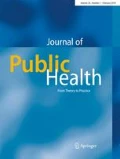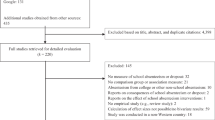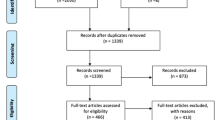Abstract
Aim
Previous studies have demonstrated a positive effect of school-based life skills programmes on the prevention of substance abuse and other health-risk behaviours in children and adolescents. However, the comparison and interpretation of study results is difficult due to methodological problems. In particular, the effectiveness of such programmes within high-risk groups remains uncertain. In this study, we investigated the effects of two school-based life skills programmes on substance abuse and subjective health in a sample with a high proportion of socially disadvantaged pupils.
Subjects and methods
We conducted a randomised controlled intervention study with repeated measurements over time. The sample included pupils of secondary schools in northern Germany with an overrepresentation of pupils with low socioeconomic status. We evaluated effects of the programmes on substance abuse and psychosocial outcomes. In addition, we conducted a process evaluation.
Results
The sample included 102 classes with a total of 1,561 pupils. Twenty-five per cent of the pupils were of a low socioeconomic status. We found significant positive effects regarding the reduction of smoking and some improvements in the pupils’ life skills in the intervention group compared to the control group. Socioeconomic status had no moderating effect on the results.
Conclusion
School-based life skills programmes have a positive effect on smoking prevention regardless of socioeconomic status. Socially disadvantaged children benefit from such programmes to a similar extent as other pupils. Pupils and teachers appreciate the programmes. A supportive school environment appears to be an important factor in the successful implementation of school-based life skills programmes.


Similar content being viewed by others
References
Ahrens-Eipper S, Asshauer M, Burow F, Weiglhofer H (2002) Fit und stark fürs Leben. Persönlichkeitsförderung zur Prävention von Aggression, Rauchen und Sucht: 5. und 6. Schuljahr. Klett, Leipzig, Germany
Atzoodien K, Bertz J, Ellert U, Erdmann F, Erhart M, Gaber E, Horch K (2007) Beiträge zur Gesundheitsberichterstattung des Bundes. Gesundheit von Kindern und Jugendlichen in Schleswig-Holstein. Robert Koch-Institut, Berlin
Cantril H (1965) The pattern of human concerns. Rutgers University Press, Piscataway, NJ
Cuijpers P (2002) Effective ingredients of school-based drug prevention programs a systematic review. Addict Behav 27:1009–1023
Currie CE, Elton RA, Todd J, Platt S (1997) Indicators of socioeconomic status for adolescents: the WHO Health Behaviour in School-aged Children Survey. Health Educ Res 12(3):385–397
Currie CE, Roberts C, Morgan A, Smith R, Settertobulte W, Samdal O, Rasmussen VB (2004) Young people’s health in context. WHO Regional Office for Europe, Copenhagen
Faggiano F, Vigna-Taglianti F, Versino E, Zambon A, Borraccino A, Lemma P (2008) School-based prevention for illicit drugs’ use. Cochrane Database Syst Revs 2008, Issue 3. Art. no. CD003020. doi:10.1002/14651858.CD003020.pub2
Foxcroft DR, Tsertsvadze A (2011) Universal school-based prevention programs for alcohol misuse in young people. Cochrane Database Syst Revs 2011, Issue 5. Art. no. CD009113. doi:10.1002/14651858.CD009113
Grob A, Lüthi R, Kaiser FG, Flammer A, Wearing AJ (1991) Berner Fragebogen zum Wohlbefinden Jugendlicher (BfW). Diagnostica 37(1):66–75
Guilamo-Ramos V, Jaccard J, Dittus P, Gonzalez B, Bouris A, Banspach S (2010) The Linking Lives health education program: a randomized clinical trial of a parent-based tobacco use prevention program for African American and Latino youths. Am J Public Health 100(9):1641–1647
Hanewinkel R, Asshauer M (2004) Fifteen-month follow-up results of a school-based life-skills approach to smoking prevention. Health Educ Res 19(2):125–137
Holstein BE, Currie C, Boyce W, Damsgaard MT, Gobina I, Kokonyei G, Hetland J, de Looze M, Richter M, Due P, Grp HSIF (2009) Socio-economic inequality in multiple health complaints among adolescents: international comparative study in 37 countries. Int J Pub Health 54:260–270
Inman DD, van Bakergem KM, Larosa AC, Garr DR (2011) Evidence-based health promotion programs for schools and communities. Am J Prev Med 40(2):207–219
Janowski A, Fittkau B, Rauer W (1981) Beurteilungshilfen für Lehrer. Hogrefe, Göttingen
Kähnert H (2003) Evaluation des schulischen Lebenskompetenzförderprogramms “Erwachsen werden”. Dissertation zur Erlangung des gesundheitswissenschaftlichen Doktorgrades, Universität Bielefeld, Fakultät für Gesundheitswissenschaften, Bielefeld, Germany
Kern R, Rasky E, Noack RH (1995) Indikatoren für Gesundheitsförderung in der Volksschule, vol 95/1. Karl-Franzens-Universität, Graz, Austria
Klasen H, Woerner W, Rothenberger A, Goodman R (2003) German version of the Strength and Difficulties Questionnaire (SDQ-German): overview and evaluation of initial validation and normative results. Prax Kinderpsychol Kinderpsychiatr 52(7):491–502
Kurth BM, Kamtsiuris P, Holling H, Schlaud M, Dolle R, Ellert U, Kahl H, Knopf H, Lange M, Mensink GBM, Neuhauser H, Rosario AS, Scheidt-Nave C, Schenk L, Schlack R, Stolzenberg H, Thamm M, Thierfelder W, Wolf U (2008) The challenge of comprehensively mapping children’s health in a nation-wide health survey: design of the German KiGGS-study. BMC Publ Health 8:196
Lovato CY, Zeisser C, Campbell HS, Watts AW, Halpin P, Thompson M, Eyles J, Adlaf E, Brown KS (2010) Adolescent smoking: effect of school and community characteristics. Am J Prev Med 39(6):507–514
Mercken L, Candel M, Willems P, de Vries H (2009) Social influence and selection effects in the context of smoking behavior: changes during early and mid adolescence. Health Psychol 28(1):73–82
Murnaghan DA, Leatherdale ST, Sihvonen M, Kekki P (2009) School-based tobacco-control programming and student smoking behaviour. Chronic Dis Can 29(4):169–177
Paulus P (2002) Anschub.de: Allianz für nachhaltige Schulgesundheit und Bildung. Prävention 25:75–77
Ravens-Sieberer U, Thomas C, Erhart M (2003) Körperliche, psychische und soziale Gesundheit von Jugendlichen. In: Hurrelmann K, Klocke A, Melzer W, Raven-Sieberer U (eds) Jugendgesundheitssurvey. Internationale Vergleichsstudie im Auftrag der Weltgesundheitsorganisation WHO. Juventa, Weinheim, Germany, pp 19-99
Ravens-Sieberer U, Gosch A, Rajmil L, Erhart M, Bruil J, Power M, Duer W, Auquier P, Cloetta B, Czemy L, Mazur J, Czimbalmos A, Tountas Y, Hagquist C, Kilroe J, The KIDSCREEN Group (2007) The KIDSCREEN-52 Quality of Life Measure for Children and Adolescents: psychometric results from a cross-cultural survey in 13 European countries. Value Health 11(4):645–658
Ravens-Sieberer U, Erhart M, Rajmil L, Herdman M, Auquier P, Bruil J, Power M, Duer W, Abel T, Czemy L, Mazur J, Czimbalmos A, Tountas Y, Hagquist C, Kilroe J, The KIDSCREEN Group (2010) Reliability, construct and criterion validity of the Kidscreen-10 score: a short measure for children and adolescents’ well-being and health-related quality of life. Qual Life Res 19:1487–1500
Richter M, Leppin A (2007) Socio-economic differences in tobacco smoking among German schoolchildren, 1994–2002. Euro J Public Health 17(6):565–571
Robitail S, Ravens-Sieberer U, Simeón MC, Rajmil L, Buril J, Power M, Duer W, Coleta B, Czerny L, Mazur J, Czembalmos A, Tountas Y, Hagquist C, Kilroe J, Auquier P, The KIDSCREEN Group (2007) Testing the structural and cross-cultural validity of the Kidscreen-27 health-related quality of life questionnaire. Qual Life Res 16:1335–1345
Schönenberger M, Schmid H, Fäh B, Bodenmann G, Lattmann UP, Cina A, Kern W, Anliker S (2007) "Eltern und Schule stärken Kinder" (ESSKI). Ein Projekt zur Förderung der Gesundheit von Lehrpersonen, Kindern und Eltern und zur Prävention von Stress, Aggression und Sucht. Konzept und Ergebnisse eines mehrdimensionalen Forschungs- und Entwicklungsprojekts im Bereich psychosoziale Gesundheit in Schule und Elternhaus. Fachhochschule Nordwestschweiz, Olten, Switzerland
Schwarzer R, Jerusalem M (1999) Skalen zur Erfassung von Lehrer- und Schülermerkmalen. Dokumentation der psychometrischen Verfahren im Rahmen der Wissenschaftlichen Begleitung des Modellversuchs Selbstwirksame Schulen. Freie Universität Berlin, Berlin
Springer JF, Sale E, Hermann J, Sambrano S, Kasim R, Nistler M (2004) Characteristics of effective substance abuse prevention programs for high-risk youth. J Prim Prev 25(2):171–194
Thomas RE, Perera R (2008) School-based programmes for preventing smoking. Cochrane Database Syst Rev 2008, Issue 4. No. CD001293. doi:101002/14651858CD001293.pub.2
Wilms H, Wilms E (2004) Erwachsen werden. Life-Skills-Programm für Schülerinnen und Schüler der Sekundarstufe 1. Handbuch für Lehrerinnen und Lehrer. Lions, Wiesbaden, Germany
World Health Organisation (WHO) (1994) Life skills education. WHO, Geneva
Acknowledgements
The study was funded by Bundesministerium für Bildung und Forschung (BMBF), Germany. We wish to thank Dr. R. Hanewinkel, IFT-Nord, Kiel, Prof. Dr. Wegscheider, University of Hamburg, and especially R. Burow, IQSH, Kronshagen, for methodological support, as well as all teachers and pupils involved in the study.
Conflict of interest
The authors declare that they have no conflict of interest.
Author information
Authors and Affiliations
Corresponding author
Rights and permissions
About this article
Cite this article
Menrath, I., Mueller-Godeffroy, E., Pruessmann, C. et al. Evaluation of school-based life skills programmes in a high-risk sample: a controlled longitudinal multi-centre study. J Public Health 20, 159–170 (2012). https://doi.org/10.1007/s10389-011-0468-5
Received:
Accepted:
Published:
Issue Date:
DOI: https://doi.org/10.1007/s10389-011-0468-5




